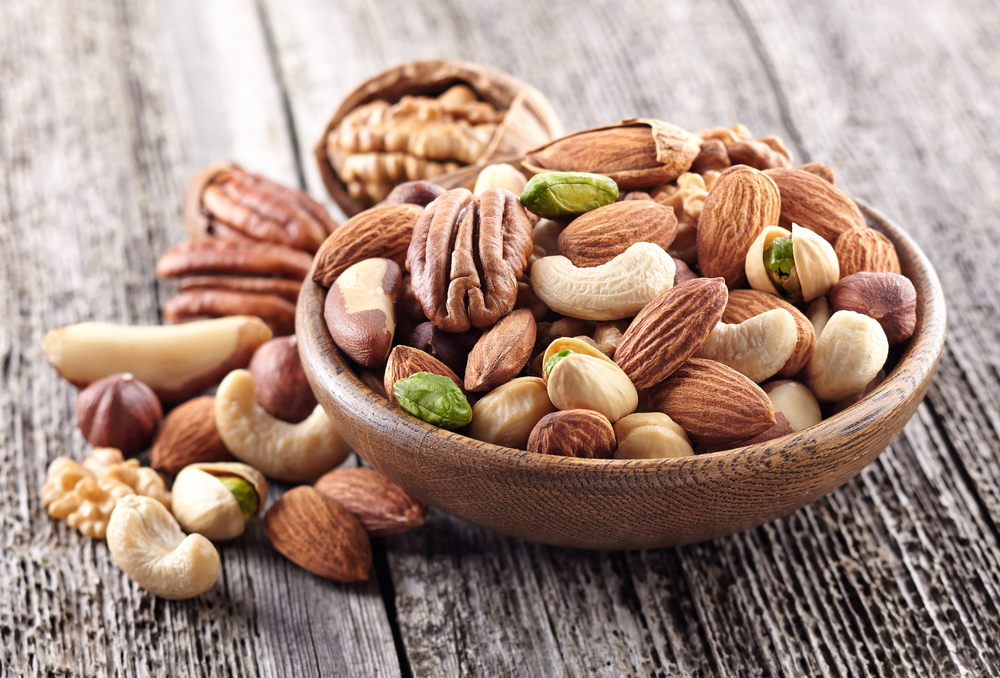A new study showed that fruit can make you happier than cake. Don’t believe us? Read on…
Staff at Bedfordshire Hospitals took part in a research study to find out how they would feel after abstaining from eating cakes and sweets for a period of time.
The recently published study in the British Journal of Medical Practitioners evaluated 44 members of staff from the cancer unit at Bedford Hospital for four months last year. This involved sugary snacks being removed from their workstations and reception desks during this period and replaced by bowls of fresh fruit, nuts and seeds. As well as losing weight, their overall happiness score (measured by a formal validated questionnaire) increased by seven per cent on completion.
Commenting on the study, Professor Robert Thomas, Oncologist and Nutritional Scientist who led the research says: ‘This was the first nutritional intervention involving hospital staff within a routine working practice. It is a simple but effective manoeuvre which could help protect staff from obesity, many other degenerative diseases and even effects from acute viral infections.’

Why stop eating sweet foods?
Here’s what too many sweet treats can cause…
Obesity, high cholesterol and cancer
Sugary foods increase the risk of unwelcomed weight gain and obesity, which in postmenopausal women, increases levels of oestrogen, insulin-like growth factor (IGF) and other hormones such as leptin, all of which in laboratory experiments increase proliferation and markers of aggressiveness and spread of cancer cells In clinical studies, obesity not only increases cancer risk but the risk of relapse and worse overall survival after successful cancer treatments.
A cohort study from America reported that those who ate more than 10 per cent of their daily calories as sugar had higher triglyceride, total LDL cholesterol and lower HDL cholesterol levels [Welsh]. People with higher LDL are at increased risk of prostate and breast cancer.
Diabetes
High sugar intake directly increases the risk of type 2 diabetes (T2D) by overloading the insulin pathways. Individuals with T2D have double the risk of heart disease and cancer due to increased serum insulin levels (hyperinsulinemia) higher oxidative stress and low-grade chronic inflammation, causing epigenetic genetic damage and ongoing malignant transformation.
Interferes with cancer treatments
Chemotherapy renders patients are more prone to dental caries which contributes to the risk of osteonecrosis following consequent bisphosphonate therapy. Dental caries may also be an increased factor for bowel cancer itself as DNA codes from bacteria, commonly found in caries (Fusobacterium) have been detected in the genes bowel cancer but not normal gut.
As oncology treatments are moving to targeted therapies such as PD-1 inhibitors, which recruit the body’s immunity to recognise and target cancer cells, the influence of diet and lifestyle is becoming even more important. A number of studies have demonstrated that better gut health is linked to significantly better response rates.
Chronic disease
Degenerative conditions such as heart disease can be toxicity following a number of cancer treatments, especially androgen deprivation therapy in men and among women receiving Herceptin. As well as stopping smoking, regular exercise, controlling blood pressure, maintaining a healthy weight and controlling cholesterol levels are important.
Damages gut health
Processed sugar is the preferred fuel for pro-inflammatory firmicutes bacteria (bad bacteria) in the gut whilst the healthy bacteroidetes (good bacteria) utilise glycans from the breakdown of polyphenols which explains why there is an inverse correlation between sugar intake and gut health.
Causes low mood
Both high sugar intake and obesity are linked to lower mood, unhappiness, fatigue and depression. Distressing in itself, studies involving people with cancer have found that those with an associated depressive illness were more likely to die specifically of cancer compared to those with normal mental health.
Benefits of whole fruit and nuts
Here’s why fruit and nuts are good for you…

Better gut health
Fruit intake is associated with better gut and general health as it provides polyphenol which feed healthy bacteria. Despite having about 9-14 per cent fructose, the fibre and pulp makes fruit satiating deterring the individual from eating other foods because consumers feel full helping people maintain a healthy weight. Nuts in particular contain pre-biotics which feed healthy bacteria.
Less diabetes
The pulp and fibre also slow down gastric emptying and thus reducing the glucose index. What’s more, the polyphenols in fruit, vegetables, nuts, legumes, herbs and spices also slows the transport of sugar across the gut wall which explains why their regular consumption is associated with a lower risk of T2D].
Lower cancer and chronic diseases
They also improve gut and systemic inflammation, enhance anti-oxidant enzyme production so reduce intracellular oxidative stress hence reduce the risk of cancer and other chronic diseases including those associated with diabetes.
Better protection from virus infections
Polyphenols have direct anti-viral properties then also reduce excess inappropriate inflammation associated with viral infections such as COVID-19.







